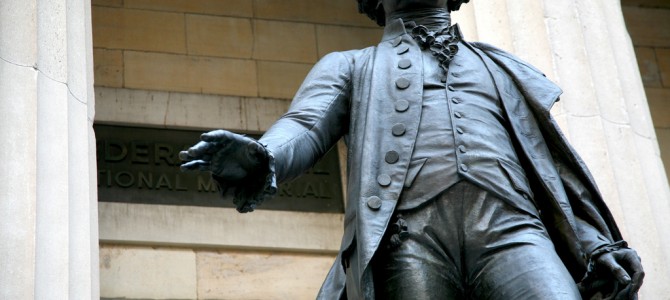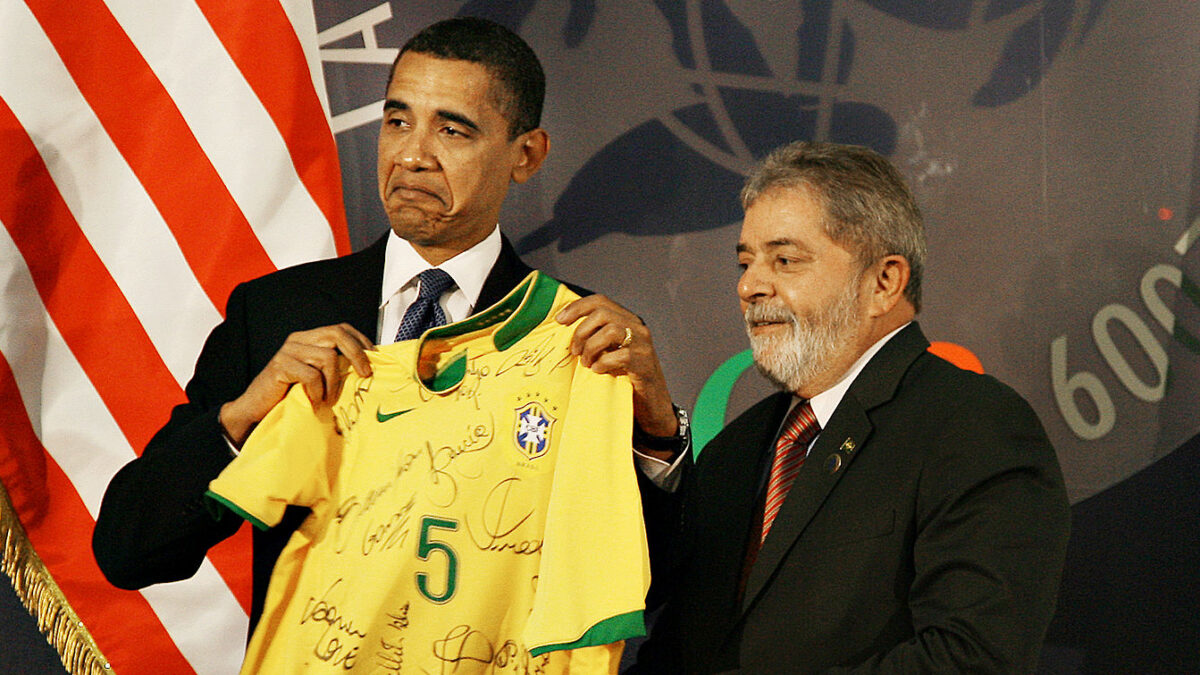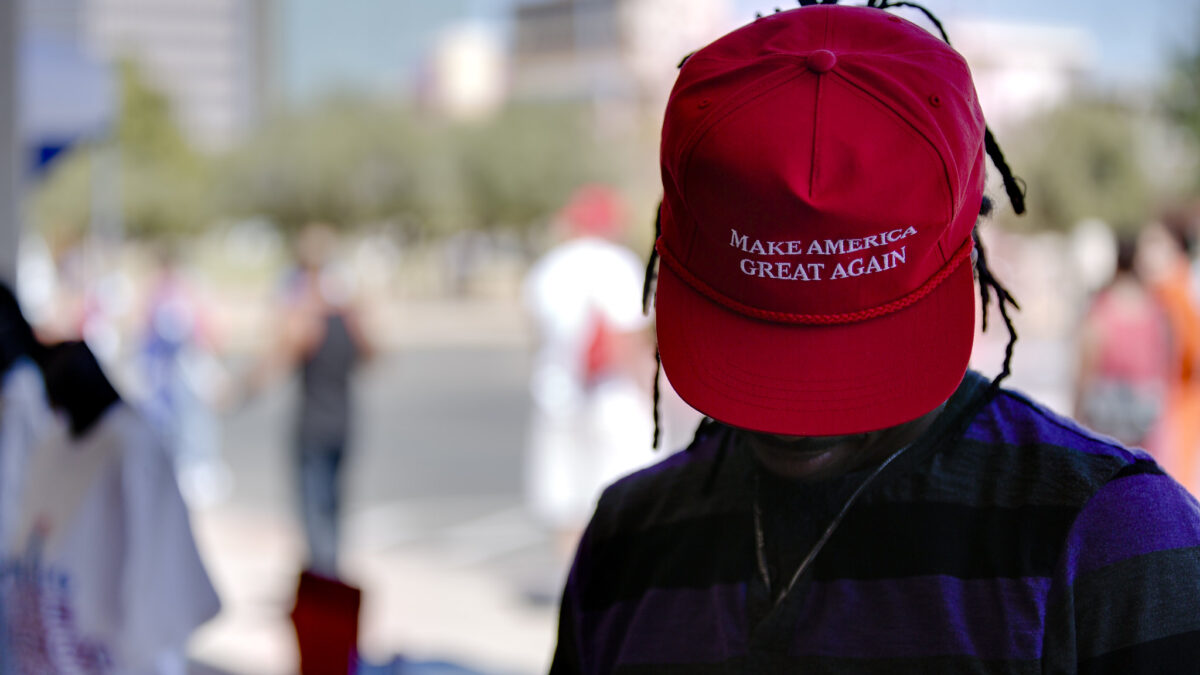
For America to flourish, it doesn’t need a “libertarian moment” or even a conservative moment, with the latter’s emphasis on “traditional morality.” It needs libertarians and conservatives to come together to defeat their common enemy—radical utopian statists and their centralized, ever-expanding welfare state. If our liberties are to be protected, conservatives and libertarians must stand united on the principles of limited government.
What America needs is a “constitutional moment.”
The Founders, particularly James Madison, understood above all else the complexity of human nature. Men are not angels, but neither are they demons. Men are physical creatures with material needs, but they are also spiritual with an eye and obligation to the transcendent. Men are rational, but prone to appetites. Men are individuals, but made to be social, to live in community. Men are free to do as they wish, but they are not free to violate others’ rights. Men are self-interested, but they sometimes choose evil (even contrary to their own self-interest)—and that evil increases with an expansion of power.
Accept Paradox
Madison and men like Thomas Jefferson, who were well steeped in John Locke’s philosophy of natural rights, sought to establish an ordered society out of these seemingly irreconcilable contradictions—contradictions that radical liberals are always futilely trying to “fix” in their ideological quest for utopia. But the Founders, with their minds informed by the Western Judeo-Christian heritage as well as the rationality of the Enlightenment (another apparent, though not actual, contradiction), were realists and accepted these contradictions. In doing so, they created a political system based on the true nature of man. The Founders learned, as Bacon said, to command nature by obeying her.
It is significant that the men who wrote the Declaration of Independence and the U.S. Constitution were themselves men of complexity. They were, as Walter Berns wrote in “The Need for Public Authority” (an essay inside “Freedom and Virtue”), private men, committed to their families, their churches, their civic organizations, but they were dedicated to public service. They had left the Old World for the New. They were informed by a civilized heritage and educated in the great traditions of the past, but were on the cusp of a new age of seemingly endless possibilities, economically, politically, and technologically. They were self-interested individuals who were deeply concerned about others.
These men, with all their complexities, came together to form a government unlike any the world had ever seen—but it was no easy task. Madison wrote in The Federalist No. 51, “If men were angels, no government would be necessary. If angels were to govern men, neither external nor internal controls on government would be necessary. In forming a government, which is to be administered by men over men, the great difficulty lies in this: you must first enable government to control the governed; and in the next place oblige it to control itself.”
Government Still Can’t Enforce Morality
The solution was to limit government. Men are not angels, so they need to be governed, but government is made up of imperfect men who are easily corrupted; therefore, their power must be limited. Hence, federalism was born.
The Founders saw limited government with all its checks and balances on power as foundational to liberty and virtue. They understood what many people fail to grasp—that an overly intrusive government corrupts virtue (as is evidenced in “too big to fail” policies, where businesses are bailed out when they should be allowed to fail, thereby giving them the opportunity to learn from their mistakes and come back stronger and better). If you’re not free to choose between good and evil, between virtue and vice, between success and failure, you don’t learn accountability and responsibility; you’re not choosing to be virtuous.
A totalitarian government suppresses virtue more extremely, as people are not free to choose the good but are coerced to comply with whatever the state deems “moral.” Coerced morality in whatever form is not virtue. As has been said, “The answer to ‘1984’ is 1776.”
Madison was fervently opposed to the government being an enforcer of morality because it is a wretched caretaker of the soul. He believed that if men are left to themselves, they will be better off. Just as he had faith in the free markets, he had faith in the individual to flourish, guided by the “invisible hand.” “If industry and labor are left to take their own course,” Madison said, “they will generally be directed to those objects which are the most productive and this in a more and certain and direct manner than wisdom of the most enlightened legislature could point out.”
The wisdom of people as individuals, not the collective, was paramount in Madison’s thinking. He believed in competition, consequences, and allowing people to pursue their own self-interest, according to their own values and religion. With this in mind, he and the Founders constructed a government in which power is so dispersed that no one faction could form a majority and violate the rights of others. If government remained limited, even unruly factions would not gain power over the rest of the citizenry. Of course, a caveat must be added here: Even Madison would have recognized, and did, that if there is a complete breakdown of morality in society, to the point that there is not “any virtue,” chaos would ensue and, inevitably, tyranny would be the result.
Privatize the Cultivation of Morality
Madison knew that society needed to be virtuous—it needs the liberal virtues of industry, personal responsibility, and cooperation—but he believed that nature and free associations were better teachers of morality (along with family and the church and other private institutions) than the state.
These views became very clear when Madison opposed a bill Patrick Henry introduced in 1784 in the Virginia House of Delegates, authorizing “a moderate tax or contribution annually for the support of the Christian religion.” Henry, who was concerned about moral decline in the nation at that time, said his goal was not religious, but secular, even pragmatic: “The diffusion of Christian knowledge has a natural tendency to correct the morals of men, restrain their vices, and preserve the peace of society.”
The bill would have allowed people to pick which church or ministry they could send their tax money, and it exempted people of other religions such as Jews and Muslims. Henry did not consider his bill to be a form of state-sponsored religion. People weren’t pressured to espouse a religion they didn’t agree with; they were merely compelled to help facilitate that virtue which was so necessary for their freedom and happiness.
As Berns points out in “James Madison and the Future of Limited Government,” Madison opposed the bill because he was concerned about state power in a multicultural environment, even more than moral decline. If you give the state power to support one religion through taxes, he argued, then you give it the power to support another. “Who does not see that the same authority which can establish Christianity, in exclusion of all other religions, may establish with the same ease any particular sect of Christians, in exclusion to all other sects? That the same authority which can force citizens to contribute three pence only of his property for the support of any one establishment, may force him to conform to any other establishment in all cases whatsoever?”
Berns wrote that another reason Madison didn’t think churches should be supported by taxes was because they had not done a very good job themselves of maintaining purity: “During almost fifteen centuries, has the legal establishment of Christianity been on trial?” Madison wrote. “What have been its fruits? More or less in all places, pride and indolence in the clergy, ignorance and servility in the laity; in both superstition, bigotry and persecution.”
This, from the man who said virtue was essential to the republic’s survival. Obviously, Madison’s realistic view of man extended to the church. If it was difficult for people to be virtuous, even in a religious setting—if they’re so prone to vice—who would grant them arbitrary power with the full force of the state behind them? Better have fallen men, endowed with reason and the little virtue they do have, work out the messy details of life among themselves. Better to have the invisible hand of the marketplace guide their lives than the heavy hand of tyranny.
The Real Threat: Collectivism
Madison was not willing to risk the enlargement of the state even to secure virtue—despite it being vital to liberty. That’s because he saw tyranny—statism—as the great threat to the republic and to the happiness of its people. He trusted the “free market” of individual action over the coercive power of the state even if the motives, like those of Henry, were well-intentioned.
The Founders trusted imperfect people to “work out their salvation,” as it were, through the ebbs and flows of civic life (and even with a little fear and trembling)—complete with all the successes and failures and messy realities of liberty. Practical reason and the wisdom that comes from experiencing the consequences of one’s actions is essential to self-government, but it cannot be attained without freedom. Government control that protects people from the consequences of their actions (e.g., poverty, because you don’t work; or pregnancy, because you can’t afford birth control pills but you had sex anyway), makes them dependent on the state, and keeps them from learning accountability and responsibility. It also replaces institutions like the family and the church, which are better equipped by nature to instruct people in ethics and morality, sharpen reason, inform the conscience, hold people to account, and show grace when they fail.
These private institutions must be strong if the federal government is to remain small. This is the message of many conservatives today, and it should be heeded. However, even as we advocate stronger families and churches and push back against moral decay in the culture, limited government should not be cast aside or demeaned as just part of the libertarian freedom agenda or an ineffectual compromise so people can just do what they want with impunity. Limited government is a gift from our Founders, a noble part of our heritage, and foundational to our republic.
Frank Meyer wrote in “Freedom and Virtue” that the great challenge of our times is modern collectivism, which is hostile to both transcendent truth and individual freedom. Liberty and virtue are not antagonistic to one another, and if we are to defeat the radicals who have usurped our nation, we must stand united in the political sphere on the principles of limited government.
Both Sides Are Too Extreme
“The idolization of heritage and tradition could not be an end in and of itself, for that would lead not to a principled conservatism, but merely to a blind obedience to that which is inherited, to little more than primitive ancestor worship,” John East wrote in his essay, “Conservatism and Libertarianism: Vital Complements” (also in “Freedom and Virtue”). For an action to be virtuous, it must be freely chosen. “Coerced virtue” is a contradiction in terms, East wrote, and on occasion traditionalism has contributed to that “theoretical confusion.”
Just as traditionalists are wrong to focus too much on virtue in the political sphere, so too are libertarians guilty of placing too much emphasis on a libertine kind of liberty in which autonomy is celebrated. As Meyer wrote, “The place of freedom in the spiritual economy of men is a high one indeed, but it is specific and not absolute By its very nature, it cannot be an end of men’s existence. Its meaning is essentially as it is, [and] cannot be an end. It is empty of goal or norm. Its function is to relieve men of external coercion so that they may freely seek their good.”
The solution to the dilemma of whether liberty or virtue is the greatest concern is the one Madison and the Founders devised in the eighteenth century when our leaders bravely opposed tyranny. “Give me liberty or give me death!” was the rally cry. Men of virtue, men of principle, men who valued family, religion, and civic associations fought for freedom so they could be pursue happiness, each according to his own path, no matter how crooked it might be.
It is precisely because the Founders understood the fallen, imperfect nature of man that they worked tirelessly to form a more perfect union in which power is dispersed among the three branches of government and the powers of the federal government are few and defined, while those of the states (which are closer to the people and diverse) are numerous and indefinite.
Focus On Government Power
The highest political objective of conservatism, as M. Stanton Evans says in “Freedom and Virtue,” is none other than the limitation of government power. Conservatives, who are facing an unprecedented power grab by radicals, need to remember this no matter how concerned they are by fringe libertarians who advocate theoretical anarchy.
“The conservative believes ours is a God-centered, and therefore an ordered, universe,” Evans wrote, “that man’s purpose is to shape his life to the patterns of order proceeding from the Divine center of life; and that, in seeking this objective, man is hampered by a fallible intellect and vagrant will. Properly construed, this view of things is not only compatible with a due regard for human freedom, but demands it” (emphasis mine).
Evans wrote that the conservative’s first concern in life is that man restrain his appetites by making right choices—choices that can only be made when man is free from coercion. However, the reign of these appetites is more destructive not when man is free but “when fallible man is endowed with unlimited power over his fellow beings. If man is corrupted in mind and impulse, he is hardly to be trusted with the unbridled potencies of the state. For both reasons, the limitation of government power becomes the highest political objective of conservatism.”
Meyer echoed this thought when he wrote in “The Twisted Tree of Liberty” at National Review that “the conservative—who understands also that power in this world will always exist and cannot be wished out of existence—stands for division of power, in order that those who hold it may balance each other and the concentration of overweening power be foreclosed. He stands for the limitation of the power of the state, division of power within the state, a free economy, and prescriptive protection of the rights of individual persons and groups of individual persons against the state.”
There are those, however, as Meyer observed, who see freedom as an end in itself. While this is true at the “political level,” it is only a means when it comes to “the higher ends of the human person.” Without reference to those ends, freedom ultimately is meaningless. While some people in libertarian circles regard the state as the greatest of political evils, conservatives do not regard the state itself as evil “so long as it is limited to its proper functions, so long as the force it wields is effectively limited by a constitutional understanding of the bounds beyond which that force may not intrude upon the sacred sphere of the individual person, and so long as that understanding is enforced by division and balance of powers.”
The Way of The Radical
Limited government is needed now more than ever with the explosion of the administrative state. Richard Weaver wrote at National Review (reprinted in “Freedom and Virtue”) in 1960 how the radical makes his will the law instead of following the rules of justice and prudence, “fancying that his dream or wish can be substituted for the great world of reality.” Weaver said the radical is the “great scorner of the past and is always living in or for the future.” He lives in a fantasy world of sorts because the future is merely one’s subjective projection and not reality. Anything that is happening in the present that does not support his dreams, his notions of the future, are dismissed as “belonging to the past” and it should be done away with as soon as the radical has the power to do it. While the conservative takes his cues from the past, Weaver said, from a tried and true heritage, the radical takes his cues from a future that is “really the product of wishful thinking.”
These radicals, of which President Obama—and Hillary Clinton—is one, pose a great danger to society because they are obsessed with changing people to bring about their utopian ideals. Weaver wrote that while conservatives are all for trying to reform their fellow citizens by the “normal processes of logical demonstration, appeal, and moral suasion, there is a difference between that and passing over to the use of force or constraint. The former is something all of us engage in every day. The latter is what makes the modern radical dangerous and perhaps in a sense demented.”
The radical’s first thought, Weaver said, is to get control of the state “to make all men equal or to make all men rich, or failing that to make all men equally unhappy. This use of political instrumentality to coerce people to conform with his dream, in the face of their belief in a real order, is our reason, I think, for objecting to the radical.”
A person can hope to change the world to make it better. “But,” Weaver warned, “when he tries to use the instrumentality of the state to bring about his wishes, then all of us are involved, and we have to take our stand.”
This is the common ground of the conservative and the libertarian as Weaver saw it in 1960. It is more true today than it was then. “The conservative in his proper character and role is a defender of liberty,” Weaver wrote. “He is such because he takes his stand on the real order of things and because he has a very modest estimate of man’s ability to change that order through the coercive power of the state. . . . I therefore can see nothing to keep him from joining hands with the libertarian, who arrives at the same position by a different route, perhaps, but out of the same impulse to condemn arbitrary power” (emphasis mine).
Together, libertarians and conservatives need to be the rightful masters Abraham Lincoln spoke of, not to overthrow the Constitution but to overthrow the men who pervert the Constitution, “for it is the only safeguard of our liberties.”









